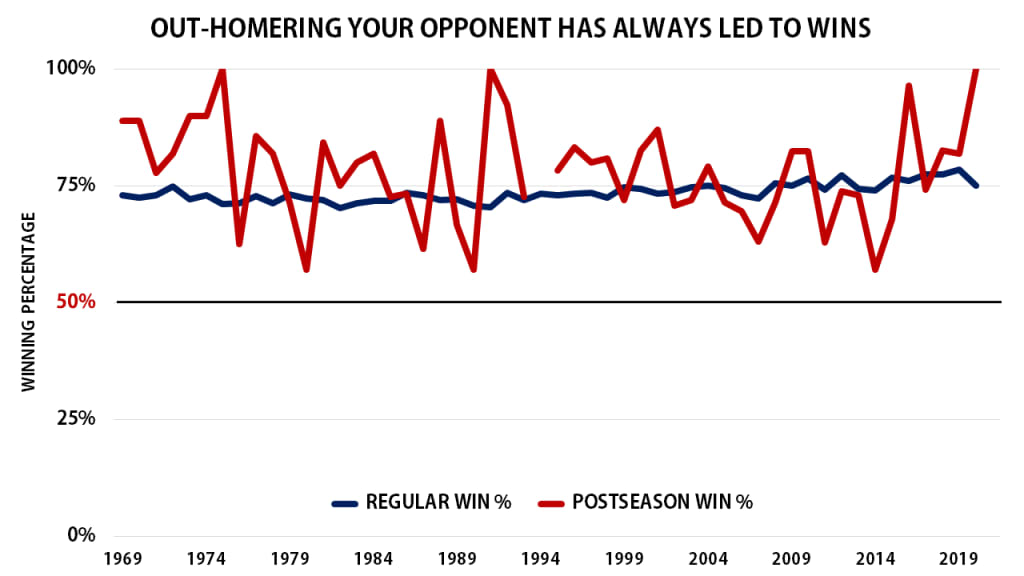In the fourth inning of Wednesday evening's Yankees-Rays Game 3, Kevin Kiermaier stepped to the plate with the score tied 1-1, after the first two Tampa Bay hitters of the inning had reached. Briefly, the television broadcast noted that the sacrifice bunt had fallen out of favor, but that this was a situation where it might traditionally be considered.
The words had barely hung in the air before Kiermaier blasted a three-run homer into the right-field seats, giving the Rays a 4-1 lead. They'd never trail the rest of the way, later adding on two more home runs to take an 8-4 win. Never bunt, hit dingers.
We bring that up not just because it was entertaining, but because if you've watched much of the playoffs this year, you've probably noticed the stat that's been kicked around, ticking upward every day:
Teams that have hit more homers in a game than their opponents are 19-1 this postseason.
That's a fun stat, if mostly because it goes against the long-discredited myth that home runs are less useful in the playoffs and that "small ball" is the better way to win. (Here are the times home runs are valuable: All of the times.) Any time someone talks about dropping down that sacrifice bunt, especially with a strong hitter, you get to reply: 19-1.
And yet: It feels like it's missing something. Is this an outlier? Is this always true? Is it more or less true than in the regular season? Was it as true in the pitcher-friendly 1960s as it is now? What about the percentage of all runs being scored on homers? Has that changed? Why would it be better to score another way?
It's a loud stat, but one that needs something added to it. Let's circle the bases.
Wait, this is obvious, why are we talking about this?
This is worth pausing for. In a lot of ways, this is incredibly self-explanatory. "Scoring runs" is literally the way that baseball games are decided. Hitting a home run is the only play guaranteed to score a run. Runs are good. And so on. It's not the only way to score or win, but it's the best way to score and win. That this is even a conversation that needs to be had is somewhat ... frustrating.
Presumably no one says touchdowns don't work in the playoffs in football, or offers concerns that too many goals are scored on the road to the Stanley Cup, and yet that persists in baseball. That teams that "live and die by the home run" are inferior is a feeling that has persisted for decades, as Rustin Dodd wrote in the Athletic last year.
It's been refuted over, and over, and over, and yet you'll still hear prominent commentators talking about the honor that comes with playing the game the right way, which, we assume, means drawing a walk, moving over on a stolen base, advancing on a productive out, and scoring on a sacrifice fly. Which is fine, for what it is -- runs are runs. You'll take them how you can get them.
But we're here for dingers. What about those dingers?
Has hitting more homers always been a big key to winning?
Well, sure. Again: Homers score runs. But let's bring the receipts, and go back a century to when Babe Ruth ushered in the "live ball" era in 1920. We're talking about 101 seasons of baseball, from then to now.
In every single one of those regular-season years, every single one, teams that outhomered their opponent won a majority of their games. That was true in 1920, when teams that hit more homers went 218-85, a .719 winning percentage. It was true in 1968's "Year of the Pitcher," when they went 655-257, a .718 winning percentage. It's been true every year.
Beyond that, it's been remarkably stable. The average regular-season winning percentage over the last century when outhomering your opponent is .725. It's never been lower than .656 (1921), and it's never been higher than .785 (2019). The short version here is that if you wanted to say that if you hit more homers than your opponent, you win about three-quarters of your games, you could. Now, then, forever.
That's even moreso true in recent years. It was .724 from 1980-'99, and .752 since 2000 -- and it's .870 over the last five years.
Again, you'd have been shocked to hear otherwise. But we're in the middle of October, so let's focus on the playoffs. So:
Is it still important in the playoffs?
Yes. Moreso, actually. We went over this last year. Because better pitchers are relied upon more heavily in the postseason, and bullpens used more aggressively, offense goes down. Strikeouts go up. Run scoring drops. The share of runs that come in on home runs increases. Try and string together a rally against Yu Darvish, or Trevor Bauer, or Gerrit Cole, or a string of relievers all throwing 99. It's incredibly difficult.
Over the last 10 seasons before this one -- so 2010-'19 -- this is what changes between the regular season and postseason:
Regular season (2010-'19)
4.4 runs/game
.728 OPS
20% strikeout rate
1.1 HR/game
40% of runs on home run
Postseason (2010-'19)
4.0 runs/game
.677 OPS
23% strikeout rate
1.1 HR/game
44% of runs on home run
So, if you plot that out since divisional play began in 1969, you'll see that the postseason win percentage when outhomering your opponent is a little less consistent than the regular season -- far smaller samples, obviously -- but the main story is the same. Never once, dating back five decades, have teams that outhomer their opponents failed to win more games than they lost.

It is, again, the best thing you can do to get runs on the board. (Plus, baked into "outhomering your opponent," of course, is that you're allowing fewer than you're hitting.)
So is it more important towards winning in the playoffs, or less?
More.
How much more?
Enough!
Winning percentage when outhomering your opponent, 1969-2020
Regular season: .736
Postseason: .780
It's tightened a little over the last decade ...
Winning percentage when outhomering your opponent, 2010-2020
Regular season: .762
Postseason: .775
... but it is, at worst, as important as in the regular season, and generally more important.
Forget wins, what about how many runs are scored off of homers?
We can do that too. Here's the percentage of runs scored via homers in the postseason over the past several years:
• 2020 54% (44% regular)
• 2019 47% (45% regular)
• 2018 42% (40% regular)
• 2017 51% (42% regular)
• 2016 43% (40% regular)
• 2015 42% (37% regular)
Each year, at least in recent history, a higher rate of runs are scored via home run in the playoffs than in the regular season, which goes back to what we said above. (Run scoring goes down, so homers, or guaranteed runs, become more valuable.)
If 54% in this year's postseason sounds like a lot, it is. It'd be tied for the highest ever, and would be the highest of the divisional era.
• 2020 54%
• 1956 52%
• 1957 51%
• 2017 51%
Wait, what happened in 1956 and '57?
Weird, right? Those were back-to-back seven-game World Series -- the only postseason games there were at the time -- between the Yankees and Dodgers in '56 and Yankees and Braves in '57. (The Brooklyn Dodgers and Milwaukee Braves. It was a long time ago.) The final three games of the '56 Series each involved one team being shut out, including Don Larsen's famous perfect game, while Yogi Berra and Mickey Mantle each hit three homers. In '57, Hank Aaron hit three more.
So should we just be counting homers?
Of course not. The Padres just outhomered the Dodgers, and lost 6-3 anyway. The Braves outlasted the Reds 1-0 in 13 innings in the first game of the Wild Card series. There's plenty of ways to win. Sometimes, under the right circumstances -- mostly with a particularly weak hitter up -- a well-placed sacrifice bunt or contact play can make more sense than swinging for the fences. (And if you have aesthetic differences with all this, that's perfectly understandable.)
But the one thing we know is happening this year is the same thing that happens every year, ever: If you hit more homers than your opponent, you are overwhelmingly likely to score more runs, and then, obviously, win the game. And isn't that what we're all after here? It's October. It's all about wins.
